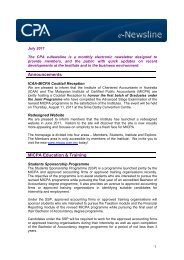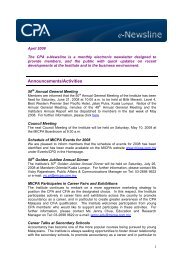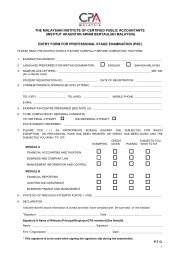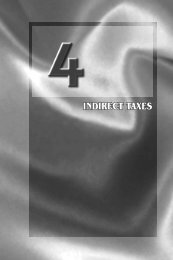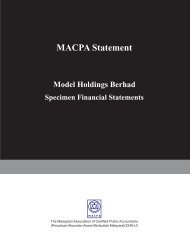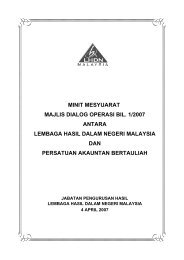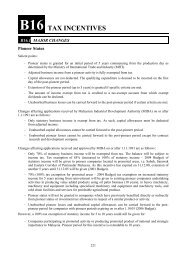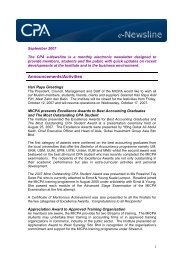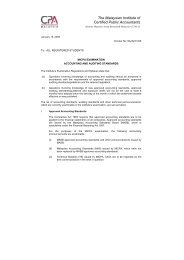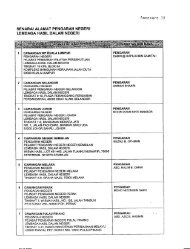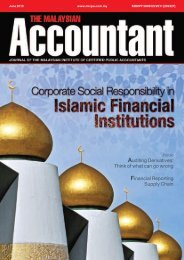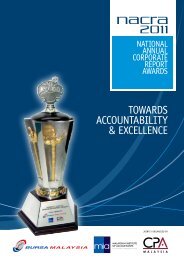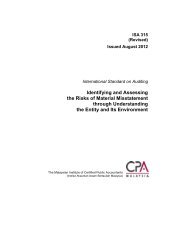The Malaysian Accountant - The Malaysian Institute Of Certified ...
The Malaysian Accountant - The Malaysian Institute Of Certified ...
The Malaysian Accountant - The Malaysian Institute Of Certified ...
Create successful ePaper yourself
Turn your PDF publications into a flip-book with our unique Google optimized e-Paper software.
license of the owner of the copyright if he (i) controls or hasthe ability to control the means, equipments, modes andinstruments by which the infringement would be effected;(ii) has knowledge or reason to suspect that suchinfringement will take place; and (iii) intends, encourages,promotes, assists or enables the use of the means,equipments, modes and instruments to effect aninfringement and takes no reasonable steps to limit the useof such means, equipments, modes and instrumentssupplied to legitimate purposes or takes no reasonablesteps to filter or block any infringement”.<strong>The</strong> difficulty remaining is whether the wrong of“causing” an infringement can only be sustained if theprimary act of infringement is completed. This appears tobe likely so. To get away from such rigidity, the law shouldbe amended to provide that causing “an imminentinfringement” or if the causative acts make it likely that aninfringement will occur, that should suffice. A suitablyworded provision would be: “copyright is infringed by anyperson who does, or causes any other person to do, withoutthe license of the owner of the copyright, an act the doingof which is controlled by copyright under this Act”.In the context of an offence for copyright infringement,it is an offence to sell or distribute infringing copies. <strong>The</strong>computer file in data format that is transmitted over thenetwork has no physical existence. It is uncertain whethersuch an infringing computer file meets the definition of itbeing an “unlawfully reproduced copy”. As mentionedearlier, by definition, “copy” must be in some materialform. Are data packets residing in a computer file inmaterial form? To remove such an uncertainty, perhaps theword “material” should be deleted from the definition of“copy”.Unauthorised distribution of the copyrighted work byway of sales is an act of infringement. Whether there issuch a distribution and sale of the infringing file isquestionable. <strong>The</strong> computer file residing in the hostcomputer is never physically moved to the downloader’scomputer. Instead the downloader creates a new file. <strong>The</strong>remay be no monetary gain. Perhaps “transmission of thework to the public by electronic or other means which uponbeing received results in the copy of the work”.Pirated works are openly advertised for sales either inthe print media or via the Internet. Accordingly the rightto advertise copyright protected work should be an actcontrolled by copyright and advertising for sales, hire orrental of infringing copies of works should be an offence.Any reproduction made including those that aretemporary or of transient duration is covered under theright of reproduction. (Examples would be copies of worksmade in the servers and other computers that are theengines of electronic commerce and digital networks) Aperson making a temporary pirated copy is no more or noless guilty of infringement than a person making apermanent pirated copy of the work. Under emerging newbusiness models the full economic benefit can be quicklyderived by making and using a temporary copy of thework. To allow the making of temporary copies thereforegoes against the copyright owners’ exclusive legalentitlement to exploit their creations. It will alsounreasonably prejudice the legitimate commercial interestsof the copyright owners. Where the making of a temporaryor transient copy is necessary for technical reasons as in thecase of acts of caching by servic providers, any exceptionshould be on condition that the service provider does notmodify or edit the contents of the work and does notinterfere with the use of technological protection measures.<strong>The</strong>re may be an exception for “the making or reproductionof temporary copies of the work if it is for technical or legalreasons and provided that there shall be no modificationor editing of the work or interference with the use of anytechnological measures by the owner”.Legal protection and remediesAdequate legal protection and effective legal remedies areprovided against the circumvention of effective technologicalmeasures that copyright owners use to restrict acts inrespect of their works which are not authorised by theauthors concerned or permitted by law. In this respect, thelaw should prohibit the business of providing circumventiontools and services. What must be suppressed is theproviding of, manufacture, importation, supply,distribution and sales of decryption devices and otherdevices and services which are intended to gain access to,or the use of copyrighted material. <strong>The</strong> factors fordetermining whether a given tool is a circumvention toolmay include those set out in the US Digital Millennium Act1998 which are (i) the way the devices and services aredesigned and/or produced; (ii) whether the way the devicesand services are marketed has any significant commercialpurpose or are the marketed for use primarily for thepurpose of circumvention; and (iii) whether themanufacturer or marketer of the devices are acting inconcert with the user who to his knowledge is using thedevices for circumvention purposes. <strong>The</strong> test has to be anobjective one.A balance must be maintained and exceptions andlimitations to the prohibitions be provided particularly inthe face of countervailing national interests such as whencopyright owners totally deny access to their works bycustomers from the non-profit sector such as educationalinstitutes, libraries and research organisations or wherelaw enforcement and national security interests or whereaccess to copyrighted material is required to achieveinteroperability of computers.Copyright owners have the exclusive right to controlretransmissions over the Internet. <strong>The</strong>y must retain theabsolute right to authorise or prohibit the retransmissionswww.micpa.com.myJune/August 2007 | <strong>The</strong> <strong>Malaysian</strong> <strong>Accountant</strong> |7



